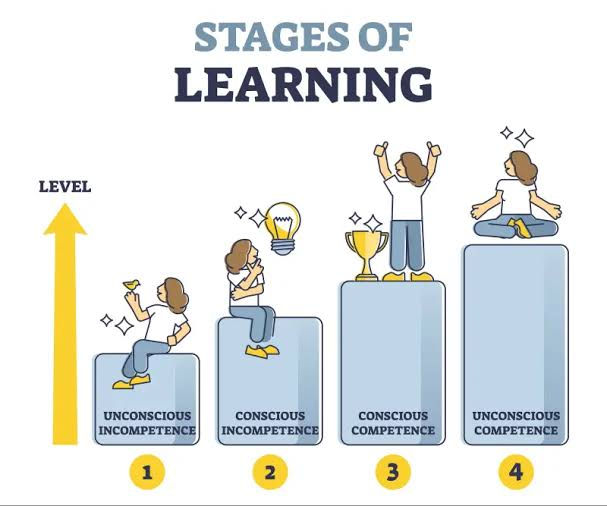
The four stages of competence
- gbucknell

- Oct 8, 2024
- 4 min read
"Repetition is the Mother of Skill": Navigating the Stages of Learning to Build Confidence, Resilience, and Courage
I was recently listening to Tony Robbins when he said something that struck me deeply: "Repetition is the mother of skill." It’s one of those phrases that, the more you think about it, the more truth it holds.
Skill development isn’t just about learning something once; it’s about mastering it through continuous effort. And as we repeat and practice, we move through different stages of learning, each one essential for growth.
In fact, the journey of mastering any skill follows a clear progression of awareness. You may have heard of the four stages of competence:
You don’t know what you don’t know.
You know what you don’t know.
You know what you know.
You don’t know what you know.
Let’s dive into how these stages, paired with repetition, build confidence, resilience, and the courage to take on new challenges.
Stage 1: You Don’t Know What You Don’t Know
In the beginning of learning anything new, we often find ourselves in this stage. We are unaware of how much there is to know or what the skill even truly involves.
We might underestimate the time, effort, and dedication needed to succeed. In this phase, it’s easy to feel either overconfident or overwhelmed because we simply don’t know what we’re getting into.
When we first attempt something—whether it’s learning a new hobby, developing a bushcraft skill, or navigating a leadership role—we're often blissfully unaware of the depth of the task at hand. And that’s okay!
This is the point where repetition starts to work its magic. Through trial and error, we slowly begin to uncover just how much there is to learn.
Stage 2: You Know What You Don’t Know
The second stage is when things start to get real. This is the phase where we realize just how much we don’t know. Suddenly, we become aware of the gaps in our knowledge and abilities. For many, this can be the most discouraging phase. It’s where self-doubt creeps in, and the temptation to give up is strong.
But this is where repetition becomes crucial. The only way to close the gap between where you are and where you want to be is through consistent practice.
Each time you repeat the process, whether you’re learning to tie a knot or deliver a public speech, you’re building those mental and physical pathways. You’re narrowing the distance between “knowing what you don’t know” and “knowing what you know.”
Stage 3: You Know What You Know
This is where confidence begins to flourish. Through repeated practice, we reach a point where we know what we know. The skill has moved from being unfamiliar to something we can execute with relative ease. At this stage, we can perform the skill with awareness and confidence, and we begin to trust in our abilities.
Reaching this stage not only brings a sense of accomplishment, but it also helps develop resilience. We’ve gone through the struggles, repeated the task over and over, and finally gained a sense of mastery. This mastery then becomes a foundation, allowing us to face new challenges with the confidence that we can learn and overcome them, too.
Stage 4: You Don’t Know What You Know
This is the final stage of true mastery. The skill becomes so ingrained in us that we don’t even realize we’re using it anymore. It becomes automatic, second nature. Think of riding a bike or typing on a keyboard—at one point, these tasks required intense focus, but now they happen without much conscious thought.
This stage is when you move with ease and flow, relying on muscle memory and intuition. At this point, you’re not only confident in your ability to perform, but you’re also in a position to take on new skills, knowing that you can repeat the same process of learning and mastery.
Repetition is the Key to Progress
At each stage, repetition plays a key role. In the early stages, it helps us identify gaps in our knowledge. In the later stages, it builds our confidence and resilience. Through repeated effort, we develop the persistence needed to push past setbacks and hone our abilities.
As Tony Robbins said, “Repetition is the mother of skill.” It’s through the act of doing something over and over that we move through the stages of learning—from complete beginner to unconscious expert. It’s a process that builds not just proficiency but also the confidence to try new things and the resilience to keep going when the going gets tough.
The Courage to Try New Things
Perhaps the most empowering aspect of skill development is how it enables us to venture into the unknown. Once we’ve experienced the process of mastering one skill, we are far less afraid to try something new. We know that it might be challenging at first, but we also know that if we stick with it—repeating, refining, and practicing—we will eventually succeed.
By trusting in the process and understanding the stages of learning, we gain the courage to take on bigger challenges. We’re no longer stuck waiting for the “perfect moment” to start. We act, knowing that the journey itself will bring us closer to mastery.
Letting Go of Total Control
One of the greatest lessons from this journey is the realization that you don’t have to be perfect before you begin. Too often, we wait until we feel fully ready before taking action. But the truth is, perfection comes through the process itself. If we wait for the perfect conditions, we’ll never move forward.
As we progress through these stages of learning, we learn to let go of the need for total control. By allowing ourselves to be imperfect at first, we embrace the learning process, trust in repetition, and grow stronger with each step forward.
So, take that first step. Embrace the process. Trust in the power of repetition, and remember—you don’t need to know everything to begin. Just start, and the skills, confidence, and resilience will follow.









Comments